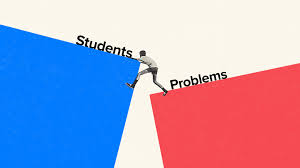Working virtually with postgraduate students—many from Wits and similar institutions—has offered me a front-row seat into the complex realities of student life. Not the surface-level stuff, but the quiet frustrations, the late-night breakdowns, the sighs after long weeks of silence from supervisors, and the look in their eyes (even through Zoom) when things finally start to make sense.
I’m not a traditional lecturer. I don’t stand in front of a classroom or give out marks. My job has mostly been to walk beside students when the work starts to feel impossible—and help them see that it’s not.
Here’s what I’ve learned they’re really struggling with.

Lost in the Research Fog
Most postgraduate students begin their research journey with excitement—then hit a wall when the proposal stage demands more than they expected.
They’re told to develop a “problem statement,” build a “conceptual framework,” and justify their “methodology”—terms they’ve heard, but never really unpacked.
Many are navigating this process alone, unsure how to turn their topic into a coherent plan. They google things, watch YouTube tutorials, and join WhatsApp groups—but the fog never lifts.
What I’ve come to realize is that their “lack of progress” isn’t because they aren’t working hard. It’s because they don’t know what’s expected of them.
What they need is someone who will slow it all down and say:
“Let’s take your topic. Now let’s find the question in it. Now let’s understand why it matters.”
One step at a time. No panic. No shame.

The Data Analysis Wall
Data analysis remains the single most intimidating part of the academic journey for most of my students.
Whether it’s SPSS, AMOS, or even basic Excel functions, many students approach quantitative analysis with a deep sense of dread. They may have collected their data successfully—but the moment they’re expected to “analyze it,” they freeze.
They’ve heard of ANOVA, regression, or Cronbach’s alpha, but no one ever really explained what these things are, or why they matter in their context.
I’ve sat with students who have copy-pasted outputs from SPSS into their dissertation but have no idea what the results mean. They worry that someone will “find out” they don’t know what they’re doing.
The issue isn’t capacity—it’s exposure. It’s the failure of institutions to bridge the gap between research design and interpretation.
What students need is not just a statistician—but someone who can translate the numbers into meaning.
Someone who can say:
“Here’s what this output tells us. And here’s how to talk about it in your discussion chapter.”

The Time Trap
One of the greatest misconceptions about postgraduate students is that they have time.
The truth? Many of them are balancing full-time jobs, raising children, caregiving responsibilities, financial instability, and—on top of all of that—a research project that demands hours they simply don’t have.
I’ve worked with students who wake up at 4 a.m. to write a paragraph. Others who send me documents at midnight because it’s the only quiet time they get. Some go silent for weeks—not because they’ve given up, but because life keeps interrupting.
We often forget that postgraduate study is a luxury—one that many are pursuing under immense personal strain.
What they need isn’t a lecture on time management. They need realistic timelines, strategic planning, and someone who understands that their progress isn’t linear.
And sometimes, they just need permission to go slow without feeling like failures.

Academic Imposter Syndrome
I wish more people understood how deeply self-doubt runs in academia—especially for students from previously marginalized backgrounds, first-generation postgraduates, and those who didn’t grow up in academic environments.
Many of my students begin their journey with a quiet but heavy belief:
“I’m not smart enough to be here.”
They second-guess every sentence they write. They apologize for asking questions. They assume every delay is a sign that they don’t belong.
And when supervisors respond coldly or critically (as many do), it only reinforces this belief.
Academic imposter syndrome doesn’t just delay progress—it erodes the student’s sense of self.
And while I can’t fix that overnight, I’ve learned how powerful it is to say:
“You’re not alone. You’re not stupid. And yes—you are more than capable.”
Sometimes, mentorship is not about teaching—it’s about affirming.

Hidden Digital Gaps
We like to assume that today’s students are “digital natives.” But being on Instagram or TikTok isn’t the same as knowing how to navigate research databases, use Google Scholar, or reference using Mendeley or Zotero.
Many of the students I work with are figuring things out on their own. They’ve never been shown how to search for peer-reviewed articles effectively, how to cite correctly, or how to format their chapters using MS Word styles.
These skills aren’t “basic” if no one’s ever taught you.
Instead of judging these gaps, we should be addressing them openly and systematically.
Because no one should feel embarrassed for not knowing something they were never taught.

Support Isn’t Extra—It’s Everything
Students need more than academic instruction—they need presence. Not someone to “fix their thesis,” but someone to walk with them, listen when they spiral, and help untangle the knots when the work becomes overwhelming.
What students fear most isn’t failure. It’s failing alone.
And sometimes, the greatest support you can offer is simple:
“Let’s open the document. Let’s start from where you are. Let’s breathe.”
Final Words
To the students out there feeling stuck, afraid, or behind: you are not alone.
You’re not failing—you’re just carrying more than most people realize. And you’re still moving forward, even if it doesn’t always feel like it.
And to those of us who’ve walked this path with students—virtually, quietly, one step at a time—let’s keep showing up.
Let’s keep reminding them that research doesn’t have to be isolating. That confusion isn’t a flaw. And that their voice matters.
I’m Tumz, the founder of Bogoni Research: “Guiding minds. Lifting burdens. One chapter at a time.”


